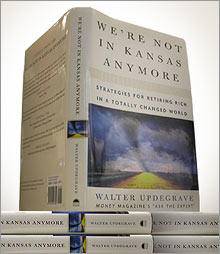|
|
|
|

|
|
More information on Updegrave's new book.
|
|
|
|
|
NEW YORK (CNN/Money) -
How are individuals affected when the Federal Reserve raises interest rates?
-- Mehul Parekh, Jersey City, NJ
First, let's get one thing straight. The Federal Reserve does not raise or lower interest rates. Not even Fed chairman Alan Greenspan has that much power.
When the Federal Reserve Open Market Committee meets on Tuesday, March 22, the big decision on the committee's agenda is whether to raise, lower or hold steady the target federal funds rate, which is the rate at which banks make overnight loans to each other.
The consensus is that the Fed will push up the target by a quarter of a percentage point to 2.75 percent, the seventh increase since the summer of 2003. A handful of bond traders expect a bump of half a percentage point. For more on why the Fed could become more agressive, click here.
The Fed doesn't directly set the rate -- rather, it performs what it calls "open market operations."
To raise the target rate, the Fed sells Treasuries and federal agency securities, which has the effect of contracting the money supply.
To lower the target rate, it buys, which increases the money supply.
Short-term rates are most affected
That said, by raising or lowering the fed funds target rate, the Fed does influence the level of interest rates. The biggest effect is on short-term rates, such as those charged on adjustable-rate mortgages, and credit cards as well as the rates banks pay on money-market accounts and short-term CDs.
When the Fed raises the target fed funds rate, the rates on loans tied to short-term indexes like the one-year Treasury index typically begin to climb.
Indeed, the prime rate -- or the rate banks charge to their best customers- -- usually climbs in lockstep with the fed funds target rate.
So, if the Fed hikes the target rate by a quarter percentage point next Tuesday, the prime rate will climb a quarter percentage point from 5.5 percent to 5.75 percent. Which means that rates will rise on loans with rates tied to the prime -- which is the case with many credit cards and home equity lines of credit.
Thus, people who already have balances outstanding on their credit cards or home equity lines will face higher interest charges, while people considering signing up for plastic or a home equity line will pay a higher rate.
Of course, whether rates overall are rising or falling, you can still save money by dealing with a lender who charges a lower rate than competitors. For the best deals on everything from credit cards to mortgages to CDs, click here.
The ripple effect
While the press tends to focus mostly on the effect the fed funds target rate has on short-term rates, the fact is that changes in this rate also have a much wider ripple effect on, among other things, the rate on long-term bonds and 30-year-fixed rate mortgages.
The reason is that when the Fed tinkers with the fed funds target rate, it also affects the economy's growth and the inflation outlook. So, for example, if investors become convinced that a rising fed funds target rate would push up short-term interest rates to such an extent that they slow economic growth and dampen inflation, then long-term bond rates might decline.
On the other hand, if investors weren't so sure the Fed's efforts to raise the target rate would appreciably slow the economy or lower inflation, then long-term bond rates might stay the same or even rise.
All of which is to say that the Fed's effect on long-term rates is more indirect and more difficult to predict. Ultimately, investors' expectations of the longer term effect of the Fed's actions on economic growth and inflation determine the course of long-term rates.
Of course, between now and Tuesday, we'll hear all sorts of speculation about what the Fed may or may not do from the vast legion of Fed Watchers out there. Then, at 2:15 PM, the Fed Open Market Committee will release its statement which will be parsed immediately by pundits galore.
Remember, though, ultimately, it's the collective reaction of people like you and me and millions of other investors -- not the Fed itself or the pundits -- that will ultimately determine both the level and direction of short- and long-term rates.
Walter Updegrave is a senior editor at MONEY Magazine and is the author of "We're Not in Kansas Anymore: Strategies for Retiring Rich in a Totally Changed World."

|